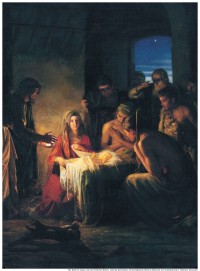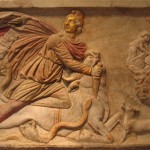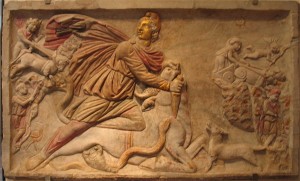 The differences between Christmas and Easter could be told as The Tale of Two Fridays.
The differences between Christmas and Easter could be told as The Tale of Two Fridays.
Black Friday
Every year, Christmas generates over $400 billion of economic activity, with a large percentage of that being spent the day after Thanksgiving, “Black Friday.” Then, for the next four weeks, the frenzied shopping continues, with the hustle and bustle of buying and baking and decorating and cooking, until by the time Christmas gets here, most of us have lost our sanity and our savings.
The Christmas season lasts about four weeks, is kicked off by “Black Friday,” and is characterized shopping, spending, and decorating.

Good Friday
And then there is Easter. Easter week often begins on Palm Sunday, and leads up to “Good Friday” which is the day most people believe Jesus was crucified (I believe it was Thursday, but that’s a different study). Then a few days later, we celebrate Easter, also called Resurrection Sunday, as the day that Jesus rose from the dead. Though Easter week is about the Resurrection of Jesus, the death of Jesus is what makes it all possible.
Generally, very little money is spent for Easter. Very little decorating is done. Maybe a few lilies are bought and eggs are decorated, but other than that, it shares none of the frantic activity that Christmas does.
Which is great. But also odd.

Birth of Jesus vs. Resurrection of Jesus
Did you ever realize that in Scripture, the birth of Jesus doesn’t really matter a whole lot? Oh sure, Matthew talks about it, and Luke gives it some room, but other than those two Gospels, it’s as if nobody cares about the birth of Jesus.
Other than Matthew and Luke, no other biblical author mentions the virgin birth. The star stops shining. The wise men disappear from the stage.
Sure, the details of the birth of Jesus are critical, crucial, important, and necessary, but it still only gets a few short paragraphs in all of the New Testament. (Somewhere, I read the number of verses that talk about the birth of Jesus compared to the number of verses that talk about His resurrection, but I cannot find it right now. Anybody ever run across this?)
The resurrection of Jesus, however, is mentioned in all four Gospels, appears in nearly every chapter of Acts, and finds its way into the center of Paul’s thinking, Peter’s sermons, and John’s writings. It is almost as if the New Testament writers were saying, “The birth of Jesus? Meh … But the resurrection of Jesus? Now that’s the good stuff!”

Re-do the Calendar: Focus on the Resurrection of Jesus
If I could change one thing about the church’s annual calendar, I would do away with the overemphasis on Christmas, and put Easter in it’s proper place of importance. When I was a pastor, I usually preached on Christmas themes during the entire month of December, but only preached about Easter on the one day of Easter.
If I could do it all over again, I might try to follow the emphasis given in Scripture. I would only preach about the birth of Jesus one time per year, or maybe every other year, but preach and teach about the resurrection of Jesus every chance I got, and especially leading up to Easter Sunday.
The problem, however, is that for some reason, most of us don’t get nearly as excited about the resurrection of Jesus as we do for the virgin birth of Jesus.
But I think that when the truth of the resurrection of Jesus gets a hold of our mind, it radically changes, challenges, and inspires us in the same way it did for the early believers.
So forget about Christmas! This week, this month, this year, let’s focus on the resurrection of Jesus!
The cross of Jesus is CENTRAL to everything!
Transform your life and theology by focusing on the crucifixion and resurrection of Jesus:
Fill out the form below to receive several emails from me about the death and resurrection of Jesus.
(Note: If you are a member of RedeemingGod.com, login and then revisit this page to update your membership.)




 On Easter I wrote a post called
On Easter I wrote a post called  Several years ago, I wrote a post about an online movie called
Several years ago, I wrote a post about an online movie called  Furthermore, though we celebrate the birth of Jesus on December 25, few people believe he was actually born this day, nor does the Bible ever say that this is the day of His birth. The parallel is contrived.
Furthermore, though we celebrate the birth of Jesus on December 25, few people believe he was actually born this day, nor does the Bible ever say that this is the day of His birth. The parallel is contrived. Or let me approach this another way. Did you ever hear the story of a fancy ship that ran into an iceberg on its maiden voyage and sank as a result, killing more than half of the people on board because there were not enough lifeboats? No, I’m not talking about the Titanic. The name of the ship was the Titan, and this was the plot of a fictional novel called
Or let me approach this another way. Did you ever hear the story of a fancy ship that ran into an iceberg on its maiden voyage and sank as a result, killing more than half of the people on board because there were not enough lifeboats? No, I’m not talking about the Titanic. The name of the ship was the Titan, and this was the plot of a fictional novel called 
 Have you heard any of the uproar about the excessive, over-the-top Christmas tree put up by a luxury hotel in the United Arab Emirates? Widespread criticism has been directed at the hotel for erecting a Christmas tree worth over $11 million.
Have you heard any of the uproar about the excessive, over-the-top Christmas tree put up by a luxury hotel in the United Arab Emirates? Widespread criticism has been directed at the hotel for erecting a Christmas tree worth over $11 million.
 I love Christmas carols. I really do. I have many fond memories of singing carols in church while I was growing up, and listening to them in the house during the Christmas season.
I love Christmas carols. I really do. I have many fond memories of singing carols in church while I was growing up, and listening to them in the house during the Christmas season. Silent Night is another good example of a Christmas carol that present Jesus poorly. In talking about Jesus, it contains the words, “…radiant beams from thy holy face…”
Silent Night is another good example of a Christmas carol that present Jesus poorly. In talking about Jesus, it contains the words, “…radiant beams from thy holy face…”

 For example, here is what you might read: “Kwanzaa is not Christian! It was started by people of other religions who wanted to spread their false beliefs and practices.”
For example, here is what you might read: “Kwanzaa is not Christian! It was started by people of other religions who wanted to spread their false beliefs and practices.”